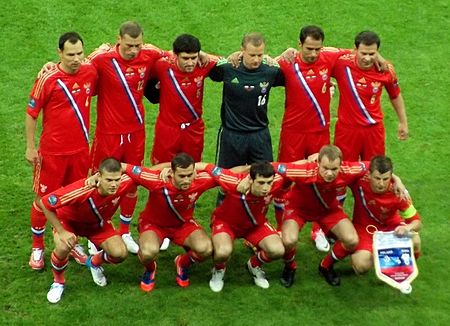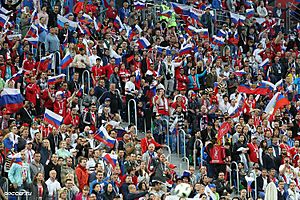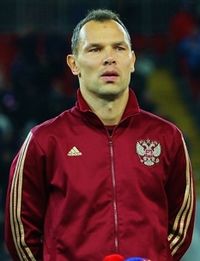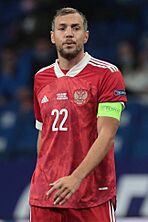Russia national football team facts for kids
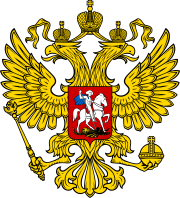 |
|||
| Nickname(s) | Сборная / Sbornaya (The National Team) Наши парни / Nashi parni (Our Boys) |
||
|---|---|---|---|
| Association | Russian Football Union (RFU) | ||
| Confederation | UEFA | ||
| Head coach | Valery Karpin | ||
| Captain | Anton Miranchuk | ||
| Most caps | Sergei Ignashevich (127) | ||
| Top scorer | Artem Dzyuba (31) | ||
| Home stadium | Various | ||
| FIFA code | RUS | ||
|
|||
| FIFA ranking | |||
| Current | 50 |
||
| Highest | 3 (April 1996) | ||
| Lowest | 70 (June 2018) | ||
| Elo ranking | |||
| Current | 33 |
||
| Highest | 7 (August 2009) | ||
| Lowest | 50 (29 March 2017) | ||
| First international | |||
| As Russian Empire: Unofficial (Saint Petersburg, Russian Empire; 16 October 1910) Official (Stockholm, Sweden; 30 June 1912) As Soviet Union: (Moscow, Russian SFSR, Soviet Union; 16 November 1924) As Russia: (Moscow, Russia; 16 August 1992) |
|||
| Biggest win | |||
| As Russian Empire: (Saint Petersburg, Russian Empire; 16 October 1910) (Moscow, Russian Empire; 23 October 1910) As Soviet Union: (Moscow, Russian SFSR, Soviet Union; 16 September 1955) (Helsinki, Finland; 15 August 1957) As Russia: (Krasnodar, Russia; 15 November 2024) |
|||
| Biggest defeat | |||
| As Russian Empire: (Stockholm, Sweden; 1 July 1912) As Soviet Union: (London, England; 22 October 1958) As Russia: (Lisbon, Portugal; 13 October 2004) |
|||
| World Cup | |||
| Appearances | 11 (first in 1958) | ||
| Best result | Fourth place (1966 - as Soviet Union) Quarter-finals (2018 - as Russia) |
||
| European Championship | |||
| Appearances | 12 (first in 1960 as Soviet Union 1992 as CIS 1996 as Russia) |
||
| Best result | Champions (1960 - as Soviet Union) Group stage (1992 - as CIS) Semi-finals (2008 - as Russia) |
||
| Confederations Cup | |||
| Appearances | 1 (first in 2017) | ||
| Best result | Group stage (2017) | ||
The Russia national football team represents Russia in international football matches for men. It is managed by the Russian Football Union (RFU). The team's main home stadium is the Luzhniki Stadium in Moscow. Their head coach is Valery Karpin.
Russia has been a member of FIFA since 1912. Before 1991, the team played as the Russian Empire and then as the Soviet Union. The team first played in the FIFA World Cup in 1958. They have played in the tournament 11 times. Their best result was finishing fourth in 1966 as the Soviet Union.
As the Soviet Union, Russia was a founding member of UEFA in 1954. They won the first European Championship in 1960. They also finished second in 1964, 1972, and 1988. After the dissolution of the Soviet Union, Russia's best result was reaching the semi-finals in 2008.
On 28 February 2022, after the Russian invasion of Ukraine, FIFA and UEFA stopped Russia from playing in their competitions. This decision followed a suggestion from the International Olympic Committee (IOC). The Russian Football Union tried to appeal these bans, but the Court of Arbitration for Sport supported the bans. Since then, the team has played friendly matches against countries mostly outside of Western Europe.
Contents
Team History and Key Moments
The Russia national football team took over from the Soviet Union national football team after the Soviet Union broke up. This means Russia inherited all the past achievements of the Soviet Union team. Russia played its first international match as an independent country on 16 August 1992. They won 2–0 against Mexico. Many players in that team had also played for the Soviet Union.
Early World Cup Appearances
Russia's first World Cup as an independent country was the 1994 FIFA World Cup in the United States. They qualified well, winning six games and drawing two. In the main tournament, Russia was in a tough group with Cameroon, Sweden, and Brazil. They were eliminated after the group stage with three points.
Euro 1996 Journey
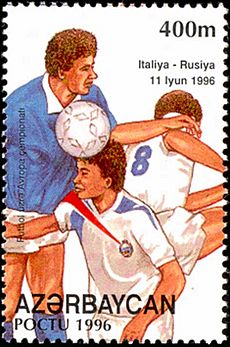
For UEFA Euro 1996, Oleg Romantsev became the coach. Russia had a great qualifying run, finishing first in their group without losing a single game. They won eight matches and drew two.
In the Euro 1996 tournament, Russia was in a group with Germany, the Czech Republic, and Italy. They lost their first two games to Italy and Germany. Their last game against the Czech Republic ended in a 3–3 draw. Russia was eliminated from the group stage.
Challenges in the Late 1990s
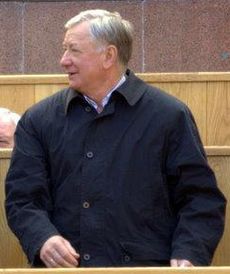
After Euro 1996, Boris Ignatyev took over as manager. Russia aimed to qualify for the 1998 FIFA World Cup in France. They finished second in their qualifying group, which meant they had to play in a play-off. They faced Italy and drew 1–1 in the first game. However, they lost the second game 1–0 and did not qualify for the World Cup.
For UEFA Euro 2000, Anatoliy Byshovets became the manager. Russia started with three losses in a row. Because of this, the Russian Football Union quickly brought back Oleg Romantsev as coach. Russia then won six games in a row, including a big 3–2 win against France. In their final game against Ukraine, a win would have sent Russia directly to the tournament. But the game ended 1–1 after a late mistake by the goalkeeper. Russia finished third in the group and missed out on another major tournament.
Team Revival and Euro 2004
Oleg Romantsev stayed as manager and led Russia to qualify for the 2002 FIFA World Cup in South Korea and Japan. They finished first in their qualifying group.
In the World Cup, Russia was in a group with Belgium, Tunisia, and Japan. They won their first game against Tunisia 2–0. But they lost 1–0 to Japan, which caused some upset in Moscow. In their last game, Russia needed a draw against Belgium to move to the next round, but they lost 3–2 and were eliminated.
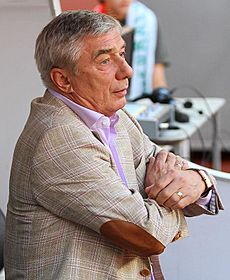
After the World Cup, Romantsev was replaced by Valery Gazzaev. Russia's qualifying group for UEFA Euro 2004 was tough. Gazzaev was replaced by Georgi Yartsev, who helped Russia qualify for Euro 2004 by winning a play-off against Wales.
At Euro 2004, Russia was in a group with hosts Portugal, Spain, and Greece. They lost their first two games and were eliminated early. However, they ended the tournament with a surprising 2–1 win over Greece, who went on to win the championship.
Russia did not qualify for the 2006 FIFA World Cup. They had a very tough 7–1 loss against Portugal, which is still their biggest defeat.
Euro 2008 Success
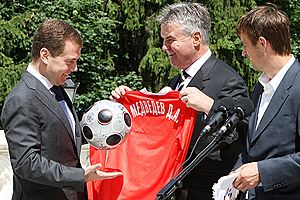
After missing the 2006 World Cup, Guus Hiddink became Russia's new manager in 2006. He led the team in the Euro 2008 qualification campaign. Russia was in a group with strong teams like England and Croatia. Russia managed to qualify for the tournament, finishing just one point ahead of England.
In the Euro 2008 tournament, Russia was in a group with Sweden, Spain, and Greece. They lost their first match to Spain 4–1. But they then beat Greece 1–0 and Sweden 2–0. This meant Russia moved to the quarter-finals, which was the first time they had passed the group stage in a major tournament since the Soviet Union era.
In the quarter-final, Russia played against the Netherlands. The game was tied 1–1 after regular time. In extra time, Russia scored two more goals to win 3–1. This sent them to their first major semi-final since the Soviet Union broke up. In the semi-finals, Russia played Spain again and lost 3–0.
World Cup 2010 and Euro 2012
Russia tried to qualify for the 2010 FIFA World Cup. They finished second in their group behind Germany. This meant they had to play in a play-off against Slovenia. Russia won the first game 2–1 but lost the second game 1–0. Slovenia qualified on the away goals rule, and Russia missed the World Cup.
Russia qualified directly for UEFA Euro 2012 by winning their qualifying group. They started the tournament with a strong 4–1 win over the Czech Republic. In their second game, they drew 1–1 with co-host Poland. However, Russia lost their final group game 1–0 to Greece, which meant they were eliminated from the tournament. This early exit led to a lot of criticism from fans and the media.
2014 FIFA World Cup and Euro 2016
In 2012, Fabio Capello became the new Russian manager. Russia qualified for the 2014 FIFA World Cup in Brazil by finishing first in their group.
In the World Cup, Russia was in a group with South Korea, Belgium, and Algeria. They drew their first game against South Korea 1–1. They then lost 1–0 to Belgium. In their final group match against Algeria, Russia needed to win to qualify. The game ended 1–1, and Russia was eliminated.
For UEFA Euro 2016, Russia qualified by finishing second in their group. During the tournament, UEFA gave Russia a warning because of crowd issues during a match against England. Russia was knocked out of the competition after losing 3–0 to Wales in their final group match. They had only earned one point from a 1–1 draw against England and a 2–1 loss to Slovakia.
Hosting the 2017 Confederations Cup and 2018 World Cup
Russia hosted the 2017 FIFA Confederations Cup. They won their first game against New Zealand 2–0. However, they then lost to Portugal and Mexico, which meant they were eliminated from the group stage.
On 2 December 2010, Russia was chosen to host the 2018 FIFA World Cup. This meant they automatically qualified for the tournament. Before the World Cup, Russia's team had not been playing well, and their FIFA ranking dropped to 70th, which was the lowest among all teams in the World Cup.
Despite this, Russia started the World Cup with a big 5–0 win over Saudi Arabia. They then won their second game against Egypt 3–1. These wins meant Russia qualified for the knockout stage for the first time as an independent country. They lost their final group game 3–0 to Uruguay, finishing second in the group.
In the Round of 16, Russia faced Spain, who were considered one of the favorites. Russia surprised everyone by beating Spain in a penalty shootout after the game ended 1–1. This was a huge upset, as Russia was the lowest-ranked team in the tournament. The win caused huge celebrations across Russia.
Russia then played Croatia in the quarter-finals. The game ended 2–2 after extra time, with Russia scoring first and last. However, Russia lost 3–4 in the penalty shootout and was eliminated. Even so, this was Russia's best World Cup performance since the Soviet Union era. After the World Cup, Russia's FIFA ranking improved from 70th to 40th.
Recent Years and Suspensions
Russia played in the 2018–19 UEFA Nations League. They started well but eventually lost their chance to move up to a higher league.
In qualification for UEFA Euro 2020, Russia finished second in their group behind Belgium. They qualified for the tournament. At Euro 2020, Russia lost their first match to Belgium 3–0 but won their second game against Finland 1–0. They were knocked out after losing their final group match 4–1 to Denmark. After this, Stanislav Cherchesov was no longer the coach.
Russia also competed in the 2020–21 UEFA Nations League. They finished second in their group and stayed in League B.
For the 2022 FIFA World Cup qualification, Russia finished second in their group behind Croatia. They were set to play in the play-offs. However, they were banned from these play-offs following the events in Ukraine.
Since 2022, Russia has been suspended from all international football activities by FIFA and UEFA. This means they could not play in the 2022 FIFA World Cup play-offs or the UEFA Euro 2024 qualifiers. The Russian Football Union has discussed possibly moving to the AFC to continue playing in major international tournaments. However, this move has not happened yet.
Russia has played more friendly matches against teams from Asia. For example, in 2024, they played in the 2024 LPBank Cup in Vietnam, defeating Vietnam 3–0. On 15 November 2024, Russia had their biggest ever win, beating Brunei 11–0. They also defeated Syria 4–0. In late 2024, Russia was confirmed to be banned from the entire 2026 FIFA World Cup qualification.
Team Look: Kits and Crests
After the Soviet Union broke up, the Russian team changed its kits. They started using red, blue, and white, which are the colors of the flag of Russia. Over the years, different companies like Adidas, Reebok, and Nike have made their uniforms.
The kits have changed designs many times. For example, the 2014 World Cup kit had a maroon and gold color scheme with patterns showing the Monument to the Conquerors of Space. The 2018 World Cup kit was red, similar to the uniform the Soviet Union Olympic football team wore when they won in 1988. This kit had the slogan "Together to Victory" printed inside.
Adidas was the official shirt supplier from 2008 to 2022. However, Adidas ended their contract after the events in Ukraine in 2022. Since 2024, Jögel, a Russian company, has been the team's official sponsor.
Kit Suppliers Over Time
| Period | Supplier | Notes |
|---|---|---|
| 1992–1993 | ||
| 1993–1996 | ||
| 1997–2008 | ||
| 2008–2022 | ||
| 2022–2024 | Kits produced in 2020 were used, without an official relationship, due to international situations. | |
| 2024– |
Match Results
Here are some of the recent match results for the Russian team.
Win Draw Loss Fixture
2024 Matches
| 5 September 2024 LPBank Cup | Vietnam |
0–3 | Hanoi, Vietnam | |
| 20:00 UTC+7 | Stadium: Mỹ Đình National Stadium Attendance: 5,315 Referee: Suhaizi Shukri (Malaysia) |
| 15 November Friendly | Russia |
11–0 | Krasnodar, Russia | |
| 19:00 UTC+3 | Stadium: Krasnodar Stadium Attendance: 26,865 Referee: Rustam Lutfullin (Uzbekistan) |
| 19 November Friendly | Russia |
4–0 | Volgograd, Russia | |
| 19:30 UTC+3 |
|
Stadium: Volgograd Arena Attendance: 35,620 Referee: Majed Al-Shamrani (Saudi Arabia) |
2025 Matches
| 19 March Friendly | Russia |
5–0 | Moscow, Russia | |
| 20:00 UTC+3 | Stadium: VTB Arena Attendance: 15,823 Referee: Ilgiz Tantashev (Uzbekistan) |
| 25 March Friendly | Russia |
5–0 | Moscow, Russia | |
| 20:00 UTC+3 | Stadium: VTB Arena Attendance: 20,864 Referee: Adel Al-Naqbi (United Arab Emirates) |
| 6 June Friendly | Russia |
1–1 | Moscow, Russia | |
| 20:00 UTC+3 | Stadium: Luzhniki Stadium Attendance: 45,638 Referee: Aliyar Aghayev (Azerbaijan) |
| 10 June Friendly | Belarus |
1–4 | Minsk, Belarus | |
| 20:00 UTC+3 | Stadium: Dinamo Stadium Referee: Sayat Karabayev (Kazakhstan) |
Team Leadership
Coaching Staff
| Position | Name |
|---|---|
| Manager | |
| Assistant managers | |
| Goalkeeping coach | |
| Fitness coach | |
| Analyst |
Manager History
Many different managers have led the Russian national football team over the years. Here's a look at some of them and their achievements.
| No. | Name | Start | End | Matches | Won | Drawn | Lost | Win % | Competitions |
|---|---|---|---|---|---|---|---|---|---|
| 1 | 16 July 1992 | 28 July 1994 | 23 | 12 | 6 | 5 | 52 | 1994 World Cup – Group stage | |
| 2 | 28 July 1994 | 11 July 1996 | 25 | 17 | 4 | 4 | 68 | UEFA Euro 1996 – Group stage | |
| 3 | 11 July 1996 | 19 June 1998 | 20 | 8 | 8 | 4 | 40 | ||
| 4 | 24 July 1998 | 20 December 1998 | 6 | 0 | 0 | 6 | 0 | ||
| 5 | 28 December 1998 | 8 July 2002 | 35 | 19 | 10 | 6 | 54 | 2002 World Cup – Group stage | |
| 6 | 8 July 2002 | 25 August 2003 | 9 | 4 | 2 | 3 | 44 | ||
| 7 | 25 August 2003 | 5 April 2005 | 19 | 8 | 6 | 5 | 42 | UEFA Euro 2004 – Group stage | |
| 8 | 18 April 2005 | 31 December 2005 | 7 | 3 | 4 | 0 | 43 | ||
| C | 1 January 2006 | 9 July 2006 | 2 | 0 | 1 | 1 | 0 | ||
| 9 | 9 July 2006 | 30 June 2010 | 39 | 22 | 7 | 10 | 56 | UEFA Euro 2008 – Semi-finals | |
| 10 | 15 July 2010 | 16 June 2012 | 23 | 12 | 7 | 4 | 52 | UEFA Euro 2012 – Group stage | |
| 11 | 26 July 2012 | 14 July 2015 | 33 | 17 | 11 | 5 | 52 | 2014 World Cup – Group stage | |
| 12 | 7 August 2015 | 30 June 2016 | 13 | 6 | 2 | 5 | 46 | UEFA Euro 2016 – Group stage | |
| 13 | 11 August 2016 | 8 July 2021 | 57 | 24 | 13 | 20 | 42 | 2017 Confederations Cup – Group stage 2018 World Cup – Quarter-finals UEFA Euro 2020 – Group stage |
|
| 14 | 26 July 2021 | 22 | 16 | 5 | 1 | 72 |
Player Records
These lists show the players who have played the most games and scored the most goals for Russia. This does not include players from the Russian Empire, Soviet Union, or CIS teams before 1992.
- Players in bold are still active with Russia.
Most Games Played
| Rank | Name | Caps | Goals | Period |
|---|---|---|---|---|
| 1 | Sergei Ignashevich | 127 | 8 | 2002–2018 |
| 2 | Igor Akinfeev | 111 | 0 | 2004–2018 |
| 3 | Viktor Onopko | 109 | 7 | 1992–2004 |
| 4 | Yuri Zhirkov | 105 | 2 | 2005–2021 |
| 5 | Vasili Berezutski | 101 | 5 | 2003–2016 |
| 6 | Aleksandr Kerzhakov | 90 | 30 | 2002–2016 |
| 7 | Aleksandr Anyukov | 76 | 1 | 2004–2013 |
| 8 | Andrey Arshavin | 74 | 17 | 2002–2012 |
| 9 | Valery Karpin | 72 | 17 | 1992–2003 |
| 10 | Vladimir Beschastnykh | 71 | 26 | 1992–2003 |
Top Goalscorers
| Rank | Name | Goals | Caps | Average | Period |
|---|---|---|---|---|---|
| 1 | Artem Dzyuba | 31 | 56 | 0.55 | 2011–present |
| 2 | Aleksandr Kerzhakov | 30 | 90 | 0.33 | 2002–2016 |
| 3 | Vladimir Beschastnykh | 26 | 71 | 0.37 | 1992–2003 |
| 4 | Roman Pavlyuchenko | 21 | 50 | 0.42 | 2003–2012 |
| 5 | Valery Karpin | 17 | 72 | 0.24 | 1992–2003 |
| Andrey Arshavin | 17 | 74 | 0.23 | 2002–2012 | |
| 7 | Fyodor Smolov | 16 | 44 | 0.36 | 2012–2021 |
| 8 | Dmitri Sychev | 15 | 47 | 0.32 | 2002–2010 |
| 9 | Roman Shirokov | 13 | 56 | 0.23 | 2008–2016 |
| 10 | Denis Cheryshev | 12 | 33 | 0.36 | 2012–2021 |
| Igor Kolyvanov | 12 | 35 | 0.34 | 1992–1998 | |
| Aleksandr Kokorin | 12 | 47 | 0.26 | 2011–2017 |
Team Achievements
Major Competitions
- European Championship
- Olympic Games
 Gold Medal (2): 1956, 1988 (as Soviet Union)
Gold Medal (2): 1956, 1988 (as Soviet Union) Bronze Medal (3): 1972, 1976, 1980 (as Soviet Union)
Bronze Medal (3): 1972, 1976, 1980 (as Soviet Union)
Friendly Tournaments
- Nehru Cup
- Champions (1): 1985
- Malta International Football Tournament
- Champions (1): 1996
- Lunar New Year Cup
- Champions (1): 1997
- Cyprus International Football Tournament
- Champions (1): 2003
Awards
- Gazzetta Sports World Team of the Year: 1979
Summary of Medals
| Competition | Total | |||
|---|---|---|---|---|
| FIFA World Cup | 0 | 0 | 0 | 0 |
| Olympic Games | 2 | 0 | 3 | 5 |
| UEFA European Championship | 1 | 3 | 0 | 4 |
| Total | 3 | 3 | 3 | 9 |
More About Russian Football
- Russian Empire national football team
- Soviet Union national football team
- CIS national football team
- Russia women's national football team
See also
 In Spanish: Selección de fútbol de Rusia para niños
In Spanish: Selección de fútbol de Rusia para niños
 | Audre Lorde |
 | John Berry Meachum |
 | Ferdinand Lee Barnett |


